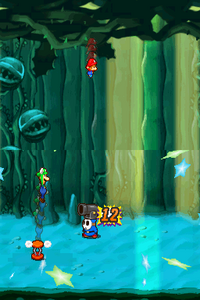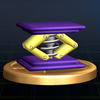Trampoline: Difference between revisions
(Those are jacks, not springboards. People needs to differenciate each other.) |
(→Trivia) |
||
| Line 84: | Line 84: | ||
==Trivia== | ==Trivia== | ||
*In ''Super Smash Bros. Brawl'', if a player bounces on a spring, the sound effect from ''[[Donkey Kong Jr. (game)|Donkey Kong Jr.]]'' from the spring that appears on the second level, can be heard. | *In ''Super Smash Bros. Brawl'', if a player bounces on a spring, the sound effect from ''[[Donkey Kong Jr. (game)|Donkey Kong Jr.]]'' from the spring that appears on the second level, can be heard | ||
*In the [[New Super Mario Bros.]] minigame [[Trampoline Time]], Mario uses self-drawn trampolines, but they are extremely different in appearance to Spring Boards. | |||
{{BoxTop}} | {{BoxTop}} | ||
{{DK}} | {{DK}} | ||
Revision as of 05:33, March 16, 2014
- “I found a springboard for you! Ground-pound it to bounce high!”
- —Luma, Super Mario Galaxy 2
Springboards, or Springs, are items that appear in the Donkey Kong series and the Mario series.
History
In the Donkey Kong arcade game, Donkey Kong would throw springs-like objects called jacks at Mario in the level 75m. If Mario gets hit by a jack, he loses a life. An actual springboard first appeared in the game's sequel, Donkey Kong Jr., prominetly featured in the game's second level. Junior can use it to jump over a gap but can also use it as a shortcut to reach the hovering platform above it. In Donkey Kong for the Game Boy, actual springboards appear alongside the harmful jacks. The Stationary Springs are found throughout levels. If Mario jumps on one, he can jump higher than usual.
Springboards can also be placed in the Game Boy game. When Mario jumps at a Spring block, the game freezes and the player has to place the Spring to any free point in the level. The Spring is timed, and disappears after the time has passed. This timer indicated with a music that starts playing as soon as the road is placed and gets faster gradually. The timer can be reset to 0 if Mario places another Spring within the first Spring's time limit, or any other placeable objects such as Roads, Ladders, and blocks. After disappearing, the Spring can then be placed with the Spring block again.
In the Mario vs. Donkey Kong series, springs are common obstacles. In Mario vs. Donkey Kong, they appear in many levels, including some boss battles, where they are often needed to clear levels. They are placed on the ground or sometimes in mid-air. Springs also make an appearance in Mario vs. Donkey Kong 2: March of the Minis, Mario vs. Donkey Kong: Minis March Again!, and Mario vs. Donkey Kong: Mini-Land Mayhem!, where they are needed to guide the Mini Marios throughout many stages. In these games, the springs can either bounce the minis straight into the air, or bounce them to the left or right. In Mario vs. Donkey Kong: Mini-Land Mayhem!, these springs are named Vertical Springs and Horizontal Springs.
In Super Smash Bros. Brawl, like a few other items (Peanut, Peach, etc.), the Spring does not appear regularly like a typical item, but appears after a certain attack - in this case, Sonic's Spring Jump. If Sonic does this in mid-air, the spring simply falls to the stage, damaging anyone unlucky enough to have it dropped on them. However, if he performs it on the ground, the spring temporarily sticks where it is, allowing other players to use it. It will disappear after approximately six seconds.
There is also another Spring in the game, which is modeled after the Mario series. Unlike Sonic's Spring, this Spring is a normal item that appears in the game regularly. If jumped on, a player will be launched in the air extra high than with a normal jump. If the Spring is knocked on its side, however, the player will be launched sideways.
In Super Mario Galaxy and Super Mario Galaxy 2, there are two types of Springboards: blue Springboards can be used by simply jumping on them, and orange Springboards can bounce Mario extra high if he Ground Pounds on them.
Super Mario 3D World features enemy springboards known as Hop-Chops. Hop-Chops often appear in groups where the player must find which is the 'correct' Hop-Chop that, rather than simply falling apart, will turn into a functional springboard upon defeat. When turned into a springboard, they function almost identically to their appearances in other Mario games: They can be carried with the run button, thrown, jumped on, and hitting them with a ground pound will cause Mario or his friends to jump extra high. Springboards will turn back into Hop-Chops after a short period of time if they are not attacked again.
Trampoline
Trampolines are objects with various uses in the Mario series. Trampolines have appeared in many other Mario games. Their first appearance was in Super Mario Bros. They were used to jump to higher places in the game. With the right timing of pressing the button, the player will have Mario (or Luigi) be able to go high in the air. They have also appeared in Super Mario World (where they were called Jumping Boards), New Super Mario Bros., Paper Mario series, and many other games. In Paper Mario a Jack-in-the-Box acted as a trampoline.
In Super Mario Bros.: The Lost Levels, there was a green type of trampoline that allowed Mario to stay in the air for a while.

A Trampoline plays an important role in the Club Nintendo comic "Mario will hoch hinaus." Trying to impress Princess Peach, Mario uses one which pushes him extremely high. Even several hours later he is still not coming down.
In Super Mario Sunshine, Trampolines appeared in Noki Bay. When water touches them, they shrink and Mario is able to carry them around, allowing him to reach different high places.
In Mario & Luigi: Partners in Time, they are very powerful Bros. Items that require the availability of all four Bros. in order to be used. Each Bro. jumps onto the trampoline, then bounces high up, farther than even the top screen. Then, the Bros. come down in random order and stomp on the foe, and if timed correctly, jump back onto the trampoline for a second (third, fourth etc.) jump. If the timing is missed, he will knock the trampoline away, ending the assault after the other three have fallen.
In Super Mario 64 DS and New Super Mario Bros., there are two minigames that use trampolines, Trampoline Time and Trampoline Terror. To play them, the player must draw lines with the Stylus to make trampolines for three Marios to bounce on.
In Super Mario Galaxy and Super Mario Galaxy 2, the trampolines here are known as Springboards, the same name as the ones from the Donkey Kong games. There are two types of Springboards: blue Springboards can be used by simply jumping on them, and orange Springboards can bounce Mario extra high if he Ground Pounds on them.
Super Smash Bros. Brawl Trophy Information
Gallery
- SMB Tram.png
Super Mario Bros.
- Shine trampoline.jpg
Super Mario Sunshine
- SMW Tram.png
Super Mario World
- PiT Trampoline sprite.PNG
'Mario and Luigi: Partners in Time
Names in Other Languages
Trivia
- In Super Smash Bros. Brawl, if a player bounces on a spring, the sound effect from Donkey Kong Jr. from the spring that appears on the second level, can be heard
- In the New Super Mario Bros. minigame Trampoline Time, Mario uses self-drawn trampolines, but they are extremely different in appearance to Spring Boards.
| Donkey Kong | |
|---|---|
| Characters | Donkey Kong • Mario • Pauline |
| Levels | 25m • 50m • 75m • 100m |
| Items and objects | Bolt • Conveyor Belt • Hammer • Ladder • Lift • Parasol, Hat & Bag |
| Enemies and obstacles | Barrel • Cement tub • Fire • Fireball • Jack • Oil drum |
| Other | 25m Theme • Gallery • Media • Opening • Staff |






